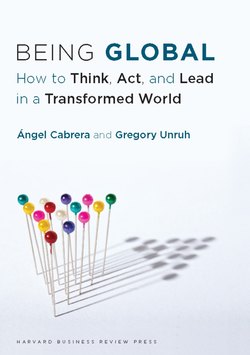Читать книгу Being Global - Gregory Unruh - Страница 6
На сайте Литреса книга снята с продажи.
In a New Global World, Leaders Need to Be Global
ОглавлениеThe abstract way in which the global actors in the news stories mentioned above are grouped together as “the textile industry,” “Russia,” and “Australia's parliament” clouds the fact that there are individual people behind those actions and decisions. Those people—people like you, whether you are at the beginning of your career or have witnessed firsthand the impact of rapid globalization, or whether you are bringing your skills to bear in business, in government, or in the social sector—are mostly struggling to tackle the new global environment in all its complexity.
To make matters worse, most undergraduate institutions, employers, business schools, and executive education programs are not yet offering much to help you prepare. It's not that they aren't trying, but despite all the “flat world” rhetoric for most institutions, especially those based in wealthy Western countries, global issues are an afterthought, a set of considerations tacked on at the end of a planning session, not a integral part of what they do and how they do it. Most organizations don't yet realize that global engagement today is not a one-way, hegemonic practice in which all major decisions, innovations, and inputs come from a Western home office. The multidirectional, multifaceted value that can come by tapping into resources, ideas, and innovations from multiple locations is lost on many businesses and individuals preparing for overseas engagements. Just as Western political figures believe that a personal background in business equips them to negotiate multilateral trade deals, so do most businesses believe that they only need to tap a rising star from the home office to capitalize on an overseas opportunity. Give managers some language training and a course in local etiquette and call them prepared.
These old global practices are not just insufficient for today's world, they are actively causing harm. Increasingly, they are leading businesses down the wrong path. Walmart's early effort to bring the big-box model to Brazil, where mom-and-pop convenience stores dominate, offers a case in point for how old global practices fail in a new global context. Walmart has deep enough pockets to learn from an expensive failure and try again, but not every company has the same luxury.
Aligning the needs, opportunities, and challenges of global engagement requires leaders at the helm who can craft solutions by seamlessly bringing together people and resources across national, cultural, and organizational lines. The skill set of the professionals tasked with overseas efforts cannot begin and end with their reputation at home. They need not only talk but listen; they need not only act but suspend judgment; they need not only bring existing value into a new context but identify where that context can return value and even influence the way headquarters does business. Most importantly, they need to ensure that all members of the relationship benefit. They can't just act global. They have to be global.
